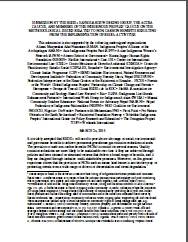
Methodological issues related to non-carbon benefits of REDD+ activities
-
Climate mitigation and adaptation
-
Peatland conservation and restoration
A policy submission by a wide range of NGO’s, including Wetlands International, to the UNFCCC with views on the methodological issues related to social, environmental and governance benefits to achieve permanent greenhouse gas emission reductions at scale. The submission provides input to REDD+, the UNFCCC mechanism to reduce emissions from deforestation and forest degradation.
It is widely accepted that the UNFCCC mechanism to reduce emissions from deforestation and forest degradation (REDD+) will need to provide a wide range of social, environmental and governance benefits to achieve permanent greenhouse gas emission reductions at scale.
The provision of such non-carbon benefits (NCBs) is crucial for several reasons. Quality emission reductions are more likely to be sustainable over time if they are achieved through policies and laws focused on structural reforms that deliver a broad range of benefits, and if they are designed through inclusive multi-stakeholder processes. Moreover, on-the-ground experience shows that the provision of NCBs such as secure land tenure is an effective way of protecting forests from a wide range of drivers of deforestation and forest degradation.
In response to SBSTA’s invitation, the organizations listed in this submission, including Wetlands International, have submitted their views on the methodological issues related to Non Carbon Benefits for SBSTA’s 40th session.

